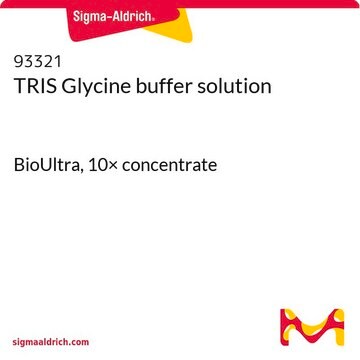T4904
Tris-Glycine Buffer 10× Concentrate
Synonym(s):
running buffer
Sign Into View Organizational & Contract Pricing
All Photos(1)
About This Item
Recommended Products
Looking for similar products? Visit Product Comparison Guide
Application
Tris-Glycine buffer 10× concentrate has been used as a transfer buffer for Western blotting.
Biochem/physiol Actions
For Western blotting and gel electrophoresis. Tris-glycine buffer is used to make a Tris-glycine-methanol transfer buffer, which is the most common protein transfer buffer for wet blot transfers. The methanol prevents the gel from swelling during the transfer and enhances the protein binding to nitrocellulose.The 10× Tris-glycine buffer is diluted to 1× with methanol and water to make a solution containing 25 mM Tris, 192 mM glycine, and 20% methanol. A sufficient amount of transfer buffer should be made to cover the electrode wires in the wet blot transfer unit and to soak the gel, membrane and blotting paper.
Other Notes
0.25 M Tris, 1.92 M glycine, pH approx. 8.3
Contains no methanol.
Contains no methanol.
related product
Product No.
Description
Pricing
Storage Class Code
12 - Non Combustible Liquids
WGK
WGK 1
Flash Point(F)
Not applicable
Flash Point(C)
Not applicable
Personal Protective Equipment
dust mask type N95 (US), Eyeshields, Gloves
Certificates of Analysis (COA)
Search for Certificates of Analysis (COA) by entering the products Lot/Batch Number. Lot and Batch Numbers can be found on a product’s label following the words ‘Lot’ or ‘Batch’.
Already Own This Product?
Find documentation for the products that you have recently purchased in the Document Library.
Customers Also Viewed
Multiple tandem epitope tagging for enhanced detection of protein expressed in mammalian cells.
Zhang L, et al.
Molecular Biotechnology, 19, 313-321 (2001)
Immunoblotting and dot blotting.
D I Stott
Journal of immunological methods, 119(2), 153-187 (1989-05-12)
H Towbin et al.
Proceedings of the National Academy of Sciences of the United States of America, 76(9), 4350-4354 (1979-09-01)
A method has been devised for the electrophoretic transfer of proteins from polyacrylamide gels to nitrocellulose sheets. The method results in quantitative transfer of ribosomal proteins from gels containing urea. For sodium dodecyl sulfate gels, the original band pattern was
Our team of scientists has experience in all areas of research including Life Science, Material Science, Chemical Synthesis, Chromatography, Analytical and many others.
Contact Technical Service







